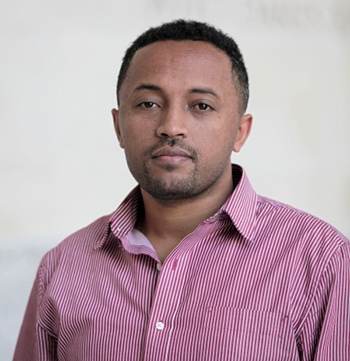Latest News Archive
Please select Category, Year, and then Month to display items
13 January 2020
|
Story Eugene Seegers
|
Photo Anja Aucamp
 Spearheading the digital expansion of the conversational Sesotho course is IDEAS Lab Director, Johann Möller (middle). With him are from the left: Prof Pule Phindane, CUT; Dr Brenton Fredericks, CUT; Bahedile Letlala, UFS Department of African Languages; and Dr Elias Malete, UFS Department of African Languages.
Spearheading the digital expansion of the conversational Sesotho course is IDEAS Lab Director, Johann Möller (middle). With him are from the left: Prof Pule Phindane, CUT; Dr Brenton Fredericks, CUT; Bahedile Letlala, UFS Department of African Languages; and Dr Elias Malete, UFS Department of African Languages.
For many years now, the UFS has been offering a one-year course in conversational Sesotho for staff members; this can then be followed up with the one-year course in advanced conversational Sesotho. The conversational Sesotho for students in the Faculty of Education was introduced in 2018 at the UFS.
The Central University of Technology (CUT) needed a conversational course for its first-year students and approached the Department of African Languages for the development of such a course. Living as we do in a multilingual country; this additional language skill opens doors and often hearts as well.
Using instructional design principles
However, the need was identified by both CUT and UFS to present this crucial information in a way that would be more appealing to digital natives as well as to those less familiar with technology. The Department of African Languages on the UFS Bloemfontein Campus, together with relevant departments from the CUT, approached the IDEAS Lab located on the UFS South Campus, since they already have a reputation for being a specialist on broadcasting and repackaging curricular content for digital presentations. The IDEAS Lab provided technical advice and built the multimedia programme, which will help the user to hear and practice phrases in Sesotho, using instructional design principles. The course will be available to both staff and students belonging to the two universities.
Room for growth
Johann Möller, Director of the IDEAS Lab, says this pilot programme will give both institutions the opportunity to test the use of multimedia for language acquisition. He adds, “Language is extremely complex, and we would like to expand this learning aid in the future.” In fact, the original design has room for growth built into it.
To keep things simple for the user and the building team, it was decided to start out with only four potential everyday scenarios where a staff member would like to speak Sesotho: Firstly, how to greet other persons from different genders; secondly, potential scenarios one might encounter in the university environment itself; thirdly, how to deal with situations at a hospital; and finally, how to use one’s language skills at a filling station.
Pronunciation is key
Each scenario contains three to four conversations that the learner can revise, along with images and audio that illustrate the situation and assist with correct pronunciation. The system does not allow the user to progress unless they have listened to the pronunciations of the sample sentences or phrases.
Further reading material and vocabulary lists are also provided, with the result that people who are using the programme can learn at their own pace. The authoring software Articulate Storyline was used to build the individual scenarios and each conversation or lesson within it. The lessons are also not dependent on an internet connection; they can be downloaded onto a flash memory drive and used offline.
First UFS/AS Young African Scholar Award winner announced
2016-03-10

Fana Gebresenbet Erda, winner of the first University of the Free State /Africa Spectrum Young African Scholar Award, for his research on political economy.
Photo: Supplied |
Scholarship in African Studies still faces the challenge of capacity-building to increase ownership by authors and institutions from and on the African continent. It also requires more coordinated efforts to provide the space deserved by African authors in the international domain. In 2015, the University of the Free State (UFS) Centre for Africa Studies joined forces with Africa Spectrum (AS) in a bid to address this issue by establishing the UFS/AS Young African Scholar Award.
This award seeks to strengthen efforts to promote internationally recognised African scholarship in African Studies. One way to achieve this objective is through publishing articles by researchers based in Africa and in the diaspora in Africa Spectrum, an accredited journal compiled by the German Institute of Global and Area Studies in Hamburg.
The inaugural award winner
Fana Gebresenbet Erda, a PhD candidate in a Global and European Studies programme jointly offered by the University of Leipzig (Germany) and Addis Ababa University, wrote the winning article for 2015. He will receive a three-year affiliation to the UFS Centre for Africa Studies as a Research Fellow, along with prize money of R5 000, sponsored by the UFS.
His article, The Ethiopian Developmental State in Its Peripheral Lowlands: Large-Scale Land Acquisitions, the Politics of Dispossession and State Remaking in Gambella, Western Ethiopia, argues that development through large-scale land acquisitions in Gambella, Western Ethiopia, belies a state-remaking project under a dispossessive political economy.
Submission now open
Africa Spectrum invites scholars to submit research articles in the context of the award. In October of each year a review committee selects submissions for review. Those eligible to submit are postgraduate students nearing completion of their PhD theses and postdoctoral scholars who were awarded their PhDs no more than five years earlier at the time of the submission deadline. Those submitting should be from Africa or should be affiliated to African institutions.